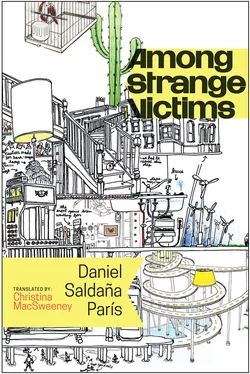Rodrigo asked if he could sit down, and the girl with the long lashes answered with a smile while taking a cigarette from a packet and rummaging in her bag for a lighter. Rodrigo decided that what could have been indifference was assent and took the seat beside her. The other girl seemed more concerned with the ambiance of the cantina and only gave him a distracted, aloof glance, the way you look at someone who comes up to offer goods for sale at an inopportune moment.
The girl with the lashes was called Domitile and was French. She spoke faltering Spanish but incorporated into it Norteño expressions, as if she had learned to speak by deciphering narco-corridos. They were both nineteen and had been living in Mexicali for eight months on a cultural exchange — as they explained — which allowed them to spend a year in Mexico learning the language before returning to begin their university studies in their respective countries — the more standoffish one was from Poland. Rodrigo was surprised by the unlikely fate that had befallen them, and jokingly apologized, in the name of all Mexicans, for the ugliness of Mexicali. Domitile agreed, smiling widely again, and explained that they were now on a group trip around the whole country, with the aim of experiencing something besides the unbearable heat of their adoptive city. In comparison with Mexicali, Los Girasoles seemed — according to the French girl — like paradise. The rest of the group was in a hotel on the outskirts of town, and they were the only ones who had dared to leave the comfort of their accommodations to seek a little local color and sample something of the way of life in the town. They had ended up in this cantina thanks to a guidebook — a particularly bad one — that only suggested anodyne places that were, therefore, characteristic of every town and settlement mentioned.
The Polish girl, with obvious annoyance, moved her seat away from her companion’s cigarette smoke, and Rodrigo took advantage of this distance to strike up a more intimate conversation with Domitile. She was from Nantes, had never before been outside France, and had chosen Mexico in the hope of finding a more humid climate and the constant sound of danceable music, only to be confronted with the fact that neither of these things existed in Mexicali. The Norteña music was, for her, little less than dodecaphonic, and she invariably suffered a nosebleed every afternoon due to the exquisite sun of the city and the desert dust. Her journey around Mexico, though brief and organized by people unacquainted with the local terrain, was in some way redeeming the previous months of suffering. She even thought Los Girasoles was pretty, compared with the neighborhood in which she had lived in Mexicali, in the house of a middle-class couple who had given the two girls room and board in exchange for sending their son to France the following year.
Domitile didn’t know much about Mexico, and what she did know was information that Rodrigo, a resident of the capital and more used to the southern cities, didn’t share. She told stories about quinceañeras where the people fired into the air after a quarter of an hour spent swigging from a bottle with no label.
Rodrigo learned that the other girl was called Daga, or rather that she had an unpronounceable name that she had exchanged for this simpler nickname while in Mexico. Daga muttered a beautifully enunciated “Mucho gusto” when she felt herself being referred to, and then asked, in a Spanish her companion must have envied, if he liked the music in the cantina. At that moment, a deeply emotional song was playing that Rodrigo had heard one too many times the year before, at the exit of every metro station and in the streets crammed with ambulant vendors around the museum. He said no, he didn’t like Mexican music, or at least not this kind, and that the only Mexican music he did like was the son jarocho and some rock ’n’ roll numbers from the sixties that were extremely free translations of songs from the States: “Angélica María, for instance, or the incunable Rockin Devil’s,” added Rodrigo, making erroneous use of an adjective that, to him, always sounded like it meant famous. Daga looked as if she had no idea what he was talking about, and Domitile explained that Mexicali only had rancheras and narco-corridos, and that they still hadn’t worked out the difference between these two genres despite having spent various months being forced to listen to them, in the same way that prisoners in Guantánamo had to listen to Barney the dinosaur. To Rodrigo, this political allusion sounded, quite rightly, frivolous, and he thought his relationship with these outsiders was, from that moment, condemned to unmitigated failure.
Rodrigo ordered a round of beers and two tequilas (Daga didn’t want one), and they clinked glasses in a not especially cordial toast while he returned to his private conversation with Domitile. She had not yet been to DF but would be going there in five or six days, she couldn’t remember exactly when, and Rodrigo recommended a couple of neighborhoods not to be missed during her nocturnal excursions, when she again left her boring group of students in the boring hotel restaurant to go out and sample the local nightlife of that monstrous city. Domitile wrote down the names in a notebook she carried in her bag and thanked him for the information with disarming innocence. She said DF was what she was most looking forward to because she’d read the French translation of Bolaño’s The Savage Detectives as soon as she’d learned that she had been awarded the annual exchange grant (in fact, what she said was “anal exchange grant,” but Rodrigo turned a deaf ear to the imbecilic pun and inwardly pardoned Domitile’s poor command of the language). Rodrigo told her he hadn’t read The Savage Detectives, even though he had in fact done so and hadn’t liked it, and preferred to sound ignorant rather than question the adolescent’s tastes. Domitile attempted, without much luck, to summarize the plot of the novel but stopped short to include Daga in the conversation, referring to one of their traveling companions whom they had secretly nicknamed Ulises Lima (Daga had also read Bolaño, apparently).
They continued drinking and tried to agree on which one of them would go to the jukebox to choose the next record. Rodrigo gave way under pressure from the others, alleging his knowledge of the field, and walked to the jukebox, taking a five-peso coin from the pocket of his pants. As he began to flick through the sheets of the cantina’s musical menu, a drunk who was sinking into sentimentality in a nearby chair shouted, “Don’t put on anything stupid, you fucking sod,” and Rodrigo felt too intimidated to choose a song based on his very personal criteria, so he returned to the table and said, “We’d better be going.” Domitile understood the situation and looked serious. Daga was already serious and simply took her bag from the back of her chair and sprang up, as if she had been wanting to do so for several hours.
They left the cantina, and Rodrigo realized that Domitile was having difficulty walking, as if she were very drunk or some bug had bitten the sole of her left foot. He inquired and discovered that the girl’s unsteady gait was a mixture of drunkenness and accident: she’d twisted her ankle a few days earlier, at a waterfall they had visited in another state; besides which, she was sloshed, and when she was sloshed she always walked a bit oddly. From her explanation, Rodrigo understood that Domitile had only ever been sloshed in Mexico, and he thought of her parents’ concern when they learned that Mexicali was Mexicali and that laws in Mexico were mere suggestions.
Domitile started saying her elder sister was still calculating the price of things in francs, but that she, born seven years later, didn’t remember ever having seen a franc and that euros seemed to have been there forever. She laughed inappropriately, unconcerned whether either of her companions shared the joke, if that’s what it was. They walked around the market in search of another open bar and during that search passed along a street lined with prostitutes.
Читать дальше









